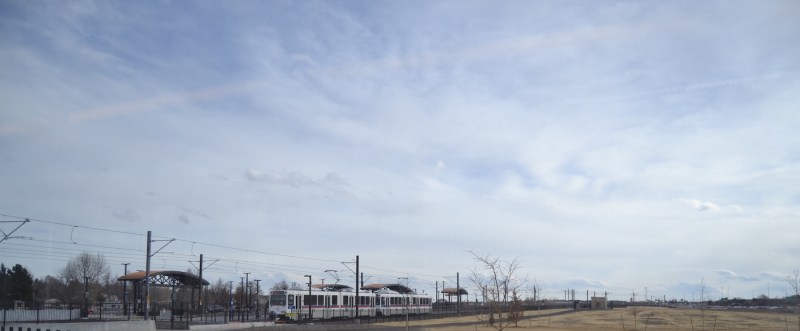RTD Can’t Market Away Low R Line Ridership and Shouldn’t Fund Empty Rail Over Full Buses

RTD is wedged between a rock and a hard place. The agency wants to serve the most people possible on a tight budget but has to appease suburban officials who don’t want service shifted away from rail lines with extremely low ridership.
The underfunded transit agency faces gloomy revenue forecasts, a severe driver shortage that’s stranding riders, and a legislative screw-up that shorted the agency millions. RTD is stretched too thin, so it’s cutting service to make ends meet.
Aurora Mayor Steve Hogan, naturally, doesn’t want those service cuts to hit the six-month-old R Line, even though ridership is minuscule — under 40 boardings an hour. That’s the lowest of any light rail line in the district, so the agency proposed cuts in August that would end R Line service at Florida station outside of rush-hour and on weekends. Riders would have to transfer if they wanted to travel further south into the suburbs and exurbs.
“We have RTD that does a good job at building things but doesn’t seem to do a good job at advertising the fact that they exist,” Hogan told 9News.

Hogan’s assertion is unfair. Walkable and dense land use, frequent transit service, and a good network design — not advertising — is the recipe for ridership. As Streetsblog reported when it opened, the R Line is surrounded by car-centric, suburban sprawl. Hogan can change if he wants to.
“All the other lines received the same type of marketing that we did for the R Line — the H Line and the new B Line and the A Line — and from day one, we met expectations in terms of ridership or exceeded them,” RTD service planner Jessie Carter said during the RTD Board of Directors meeting Tuesday.
Nevertheless, RTD walked back its proposal. The new proposal leaves the weekday schedule intact, while weekend trains would arrive every 30 minutes instead of every 15. RTD staff also revised planned frequency cuts to the W Line to Golden. If Board members end up adopting the change, an original savings of about $3.3 million will become a savings of about $1.75 million.
And it’s bus riders who will suffer, District M Director Natalie Menten said.
“If we are boosting up this weaker — right now — part of the system on the shoulders of the bus riders… then I don’t think that’s fair to the system or the riders overall,” Menten said. “Because just under 70 percent of our riders are bus [riders].”
Don’t get it twisted: Cutting frequency is bad for transit, and that’s not lost on the Board. “To increase our demand, we have to make it reliable,” said District K Director Paul Solano. “And if they don’t know if it’s gonna be cut from one season to another, I mean, they’re not gonna rely on it and they’re not gonna use it.”
But RTD has a state mandate to serve a giant region, so it has to put its service where the riders are. That’s in places where the land use supports transit with population density and walkability. If Aurora develops these characteristics as planned, the service can always change — RTD revises service three times a year. In the meantime, if Hogan and other suburban officials want more service, they can pay for it themselves, like Boulder does and like Denver is considering.
Asked whether money going toward low-performing rail might have gone toward the bus system, here’s what Scott Reed, assistant general manager of communications, told Streetsblog in an email:
We do have a certain amount of flexibility in our budgeting process, but I will need to get more info as to how much we could move around if we were to fund more service. It’s not zero sum, per se, but it is obviously limited.
“Our core mission is not necessarily running vehicles. Our core mission is moving people,” said assistant general manager of bus operations Bruce Abel. “And so it’s an attempt to match the service delivery to the ridership.”
The RTD Board will vote on the final changes, which will go into effect in January, next month.
This article was updated to correct Director Natalie Menten’s district, which is M, not G.


